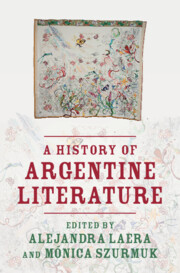Book contents
- A History of Argentine Literature
- A History of Argentine Literature
- Copyright page
- Contents
- Figures
- Contributors
- Editors’ Acknowledgments
- Introduction
- Part I Literary Dates
- Part II Critical Inroads
- Chapter 11 Print Culture in the Nineteenth Century
- Chapter 12 Criollismo: Gauchos in Literature and Film
- Chapter 13 Race and Nation
- Chapter 14 Science in Argentine Literature
- Chapter 15 Essay and Territory: The Geography of National Identity
- Chapter 16 Music as Sonic Literature
- Chapter 17 The Jewish Presence in Argentine Literature
- Chapter 18 Emancipation: Twentieth-Century Female Writers, Journalists, and Activists
- Chapter 19 Forsaking Tradition: Dislocating the Sovereignty of Argentine Literature
- Chapter 20 Mujeres raras: Patriarchal Nightmares, Dissident Imagination
- Part III Literary Names
- Index
- References
Chapter 19 - Forsaking Tradition: Dislocating the Sovereignty of Argentine Literature
from Part II - Critical Inroads
Published online by Cambridge University Press: 09 May 2024
- A History of Argentine Literature
- A History of Argentine Literature
- Copyright page
- Contents
- Figures
- Contributors
- Editors’ Acknowledgments
- Introduction
- Part I Literary Dates
- Part II Critical Inroads
- Chapter 11 Print Culture in the Nineteenth Century
- Chapter 12 Criollismo: Gauchos in Literature and Film
- Chapter 13 Race and Nation
- Chapter 14 Science in Argentine Literature
- Chapter 15 Essay and Territory: The Geography of National Identity
- Chapter 16 Music as Sonic Literature
- Chapter 17 The Jewish Presence in Argentine Literature
- Chapter 18 Emancipation: Twentieth-Century Female Writers, Journalists, and Activists
- Chapter 19 Forsaking Tradition: Dislocating the Sovereignty of Argentine Literature
- Chapter 20 Mujeres raras: Patriarchal Nightmares, Dissident Imagination
- Part III Literary Names
- Index
- References
Summary
This is a chapter about the desire to escape, to flee, to desert the Argentineity of Argentine literature; about a force bent on undermining or abandoning Spanish, on imagining literary projects placed beyond, underneath, or against the institutionalized understanding of a national tradition based on long-held beliefs in sovereign forms of language, territoriality, and identity. It focuses on a discursive force lurking behind a list of proper names – J.Rodolfo Wilcock, Copi, Sylvia Molloy, Edgardo Cozarinsky, María Negroni – rendered visible by a shared will to displace the boundaries of the Argentine tradition as a cultural site that lends itself to processes of subjectivation and misidentification. The textual moments and stances analyzed inscribe displaced writerly practices (always marked by ambivalences and unresolved tensions) in a designated, reimagined foreign space, at once strange and familiar – be that a specific cultural and linguistic location in the Global North (Rome, Paris, New York) or an indeterminate site marked by indexical signs of elsewhereness.
- Type
- Chapter
- Information
- A History of Argentine Literature , pp. 286 - 307Publisher: Cambridge University PressPrint publication year: 2024



